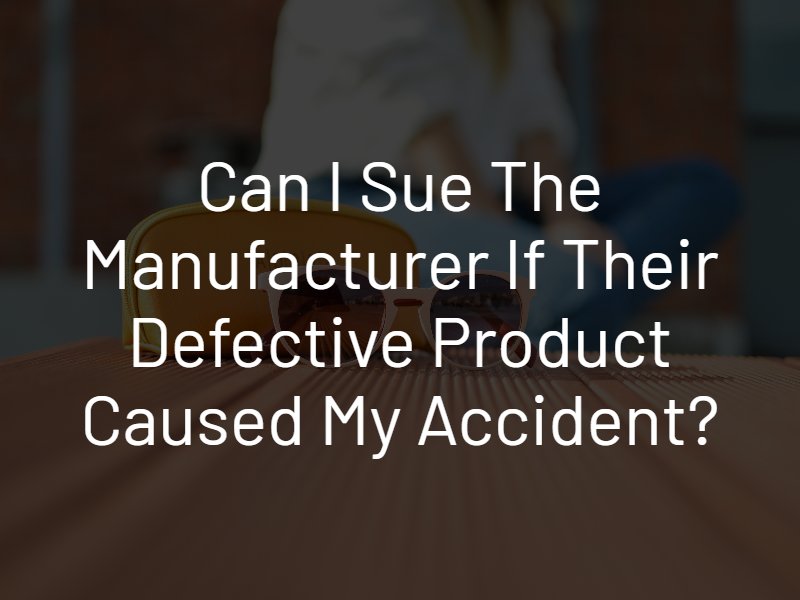
Legally Reviewed By: Robert M. Knowles
Attorney & Partner At Knowles Law Firm
Product liability claims are legal actions taken against manufacturers, distributors, or retailers of products that cause harm to consumers when the harm is caused by a defective product. These claims are essential for holding companies accountable and ensuring that products in the market are safe for regular use. Personal injury attorneys play a crucial role in helping victims seek compensation and justice for injuries caused by these defective items.
Defective products can cause serious injuries, leaving victims with medical expenses, lost income, and long-term suffering. When manufacturers, distributors, or retailers fail to ensure product safety, they can be held legally responsible. If you were injured by a defective product in Nebraska, Knowles Law Firm can help you understand your legal options and pursue the compensation you deserve.

Understanding Product Liability Claims
Product liability claims are legal actions taken against manufacturers, distributors, or retailers of defective products that cause harm to consumers. These claims can arise from various types of defects, including manufacturing defects, design defects, and failure to warn. Manufacturing defects occur during the production process and result in a product that deviates from its intended design, making it dangerous. Design defects are inherent flaws in the product’s design that make it unsafe for use. Failure to warn involves inadequate instructions or warnings about the product’s risks.
Understanding product liability claims is crucial for consumers who have been injured by a defective product. It helps them navigate the legal process and seek compensation for their losses. By recognizing the different types of defects and knowing their rights, consumers can take appropriate legal action to hold the responsible parties accountable.
You encounter thousands of different products in your everyday life. For the most part, you can trust the safety and effectiveness of these products. Unfortunately, errors can happen during product manufacturing – especially if the company is negligent. For instance, a defective car with faulty brakes can lead to serious accidents and injuries. If you discover that a defective product caused your recent accident and injury in Nebraska, find out whether you have grounds for a claim against the manufacturer.
Types of Product Defects
Manufacturing companies have legal duties, such as obeying federal safety regulations and warning consumers about known risks. Issues during the manufacturing process can lead to dangerous defects in products. A manufacturer’s duties of care include maintaining certain safety standards in the facility, properly training assembly line workers, using FDA-approved materials and ingredients, inspecting products, maintaining high quality standards, and testing new products for customer safety. If a manufacturing company skips steps, cuts corners or is otherwise negligent in the production of an item, that item could contain dangerous defects that injure consumers.
- Design defect. A problem with the design of a product that leads to a dangerous item, such as a chair designed with an unstable leg.
- Manufacturing defect. An error during a product’s manufacture that causes a defect the designer did not intend, such as a fan missing a finger guard.
- Marketing defect. An issue with an item’s marketing, packaging, instructions or warning labels, such as a child’s toy that does not list the right age range.
If the item that injured you had one of these product defects, you will not need to prove the manufacturer’s negligence to be eligible for financial compensation. You will have grounds to file a strict product liability claim instead. This type of claim says that a manufacturing company will be liable for a victim’s injuries – regardless of its negligence – if its item caused the injuries and contained a defect. You could recover compensation, therefore, without needing to provide the courts with proof of a manufacturer’s negligence.
Who Can Be Held Liable for a Defective Product?
In a product liability claim, multiple parties can be held liable for a defective product. These parties may include:
- Manufacturers: Responsible for designing and manufacturing the product, ensuring it meets safety standards.
- Distributors: Responsible for distributing the product to retailers, ensuring it reaches the market safely.
- Retailers: Responsible for selling the product to consumers, ensuring it is safe for use.
- Suppliers: Responsible for providing components or materials used in the product, ensuring they meet quality standards.
Each of these parties can be held liable for their role in creating or distributing the defective product. By identifying all potentially liable parties, consumers can strengthen their product liability claim and increase their chances of receiving fair compensation.
Elements Necessary for a Product Liability Claim
You or your injury attorney will need to establish three main elements to win a strict product liability claim for injuries caused by a defective product. The first is that the product was defective. This may require proof such as photographs of the product or the actual product in its original packaging. The second element is causation between the product’s defect and your injury. Your lawyer must show that the defective item caused your injury – not your own actions. You must have been using the product as the manufacturer intended and in its proper use at the time of your injury. The third element is damages, or specific losses you have because of the defect.
Under product liability law, manufacturers can be held accountable for defects in their products that cause harm to consumers. You will have grounds to file a strict liability claim instead.
If you cannot base your claim on the doctrine of strict product liability, you may still have grounds to file a lawsuit against the manufacturer based on negligence. To win this type of case, your lawyer will need to demonstrate the company’s breach of duty of care to you. This could refer to any action or omission that another manufacturer would not have done in the same circumstances. You may also be able to sue the manufacturer based on a breach of warranty. This is the company’s failure to fulfill a promise or guarantee it made to consumers about the safety of a product.
Keep in mind that the manufacturer may not be the only party you can hold responsible for your accident or injury. Other parties involved in getting the product to you could also be liable, such as a supplier, assembler, distributor, installer, repair team or retailer. It is important to work with a lawyer during a product liability case in Nebraska. A lawyer can give you advice about your claim and help you meet your burden of proof. A lawyer can increase your chances of obtaining fair compensation for an accident involving a defective product.
Steps to Take When Filing a Product Liability Claim
If you have been injured by a defective product, there are several steps you can take to file a product liability claim:
- Seek Medical Attention: Document your injuries and medical treatment. This is crucial for establishing the extent of your injuries and linking them to the defective product.
- Document the Product: Take photos or videos of the defective product and save any packaging or instructions. This evidence can help demonstrate the defect and how it caused your injuries.
- Contact an Attorney: An experienced product liability attorney can help you navigate the legal process and build a strong case. They can provide valuable advice and represent your interests.
- File a Complaint: Your attorney will help you file a complaint with the court, outlining the defects in the product and the injuries you sustained. This formal document initiates the legal process.
- Participate in Discovery: Your attorney will help you gather evidence and participate in the discovery process, which may include depositions and expert witness testimony. This phase is critical for building a compelling case.
By following these steps, you can effectively pursue a product liability claim and seek the compensation you deserve for your injuries.
Statute of Limitations for Product Liability
The statute of limitations for product liability claims varies by state, but it is typically two to three years from the date of the injury. It is essential to act quickly to preserve your right to seek compensation.
If you fail to file a claim within the statute of limitations, you may be barred from seeking compensation. Consulting with a product liability attorney as soon as possible can help ensure that you meet all necessary deadlines and protect your legal rights.
Damages You Can Recover in a Defective Product Suit
In a defective product suit, you may be able to recover various types of damages, including:
- Medical Costs: Compensation for medical treatment and expenses related to your injuries. This can include hospital bills, medication, rehabilitation, and any future medical care needed.
- Lost Wages: Compensation for lost income due to your injuries. If your injuries prevent you from working, you can seek reimbursement for the wages you would have earned.
- Pain and Suffering: Compensation for emotional distress and physical pain caused by the defective product. This accounts for the non-economic impact of your injuries on your quality of life.
- Property Damage: Compensation for damage to property caused by the defective product. If the defective product damaged your belongings, you can seek reimbursement for repair or replacement costs.
- Punitive Damages: In some cases, you may be able to recover punitive damages, which are intended to punish the manufacturer or distributor for their negligence or recklessness. These damages are awarded in addition to compensatory damages and serve as a deterrent to prevent similar conduct in the future.
It is essential to work with an experienced product liability attorney to ensure you receive the maximum compensation for your losses. They can help you identify all potential damages and build a strong case to support your claim.
Protecting Your Rights in a Product Liability Case – Knowles Law Firm
A defective product can cause serious harm, and when manufacturers, distributors, or retailers fail to ensure consumer safety, they should be held accountable. If you’ve suffered injuries due to a faulty product, you may be entitled to compensation for medical expenses, lost wages, and pain and suffering. Understanding product liability law is essential to building a strong case and securing the financial recovery you deserve.
At Knowles Law Firm, we have years of experience helping injury victims in Nebraska take legal action against negligent companies. We can investigate your claim, identify responsible parties, and fight for fair compensation. Don’t navigate this process alone—call (402) 431-9000 or fill out our contact form.

About Our Attorney
Robert M. Knowles
Attorney & Partner at Knowles Law Firm
Robert has tried cases in both state and federal courts and was selected as one of the top 100 litigation lawyers in Nebraska for 2014 by the American Society of Legal Advocates. Less than 1.5 percent of lawyers nationally are selected for this recognition. He is rated AV by Martindale-Hubbell which is the highest rating an attorney can obtain. He was also selected by Martindale-Hubbell as a 2019 Top Rated Lawyer.


 Menu
Menu
